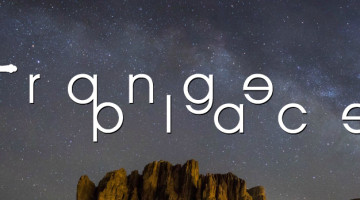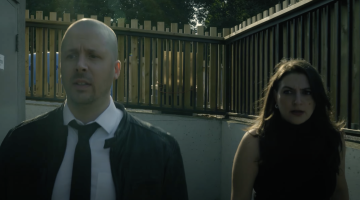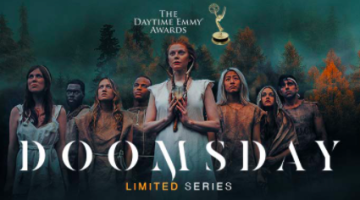
The second part of my interview with ‘Exile’ producer Andrew Stirling MacDonald. In this article we discuss the intricacies associated with writing for the web as opposed to television, as well as the benefit of writing as a team. The first article, on licensing music for your web series, can be found here.

Q: The Snobby Robot: You didn’t plan this originally as a web series. Were you planning it to be a feature or maybe to make a pilot?

A: Andrew Stirling MacDonald: Originally, “Shelter from the Storm” was going to be a sort of test-pilot for a series we’d been developing called “The Righteous.” Neill Blomkamp had just produced District 9, which was greenlit thanks in part to a test-short he’d done called “Alive In Joburg.” SciFi (SyFy these days) were doing their whole “Mini-series as a test-pilot” thing, and we thought it would be a good opprotunity to show a network that we were capable of producing a show, not just developing ideas for it. So we shot a story that took place part-way though season one of the series we’d been developing. In our original series the main characters we were following left the theatre secretly to recover something, and when they returned, they found the destruction left by Charles (at the end of Shelter from the Storm). We figured we could shoot a test-pilot based on what happened while they were gone.
The concept of developing it as a web series came during pre-production. I started delving into some of the great web series of the time – The Guild, Riese, All’s Faire and of course Dr. Horrible, which was more of a web mini-series, but still illustrated the viabilty of independently-produced, independently-distributed content. I truely believe that we are on the cusp of a new entertainment renaissance thanks to a combination of free online distribution platforms and affordably-priced prosumer electrontics. The playing field is leveling out, and you don’t need to have a ton of money to get your project made or a ton of industry connections to get it seen. When the new landscape finally settles, entertainment is going to be about three things: creativity, talent and dedication. Web series are the heralds of this renaissance, and I’m incredibly excited for the opportunity to be here right at the beginning of it.

Q: The Snobby Robot: In our article “4 Storytelling Conventions that work for TV but not for the web,” I talk about the idea of writing a feature and cutting it up into stand-alone pieces. How did you transition from making a test pilot to creating a web series?

A: Andrew Stirling MacDonald: I totally agree. Although we had decided on the format before we started writing “Shelter from the Storm,” we’d already come up with the plot, which really limited our ability to make each issue stand independently. When we sat down to plan “The Family You Choose,” that was a huge difference – we created much looser story concepts for the arc overall, and then planned and wrote each issue separately, beginning, middle and end. Our hope is that each issue can stand on its own, at least as well as episodes of any hyper-serialized show (like Battlestar Galactica or Spartacus) do.

Q: The Snobby Robot: You guys seemed to come at this writing wise from a television perspective originally, was that from experience or because you saw the show as being home on television?

A: Andrew Stirling MacDonald:I’ve been enamored of the idea of television writing (as opposed to features) for a while now. TV has played second fiddle to motion pictures for years now, but we are finally starting to see TV come into its own as a legitimate art form. It’s not just a stepping-stone anymore, instead, important directors and producers from the film world are increasingly choosing to do TV instead – Darabont, Scorcese, Speilberg. Writing in a serialized format gives you the opprotunity to develop your characters and stories over the course of dozens or even hundreds of hours, rather than just two or three. And while you can tell a kick-ass story in 3 hours, a series affords you time to dive deep into every little facet of your world. I think that is why, days after releasing the incredibly successful feature The Avengers, when Joss Whedon sat down and wrote about the future, the projects he was most excited for were both series – Dr. Horrible 2 and Wastelanders (the web series he was developing with Warren Ellis before he got picked up for Avengers). So yeah, I’d say that everyone in the writer’s room for The Family You Choose was looking at this with the mindset that we are going to be telling the sort of stories you see on Lost, or Spartacus, or Breaking Bad – long-form, with a focus on strong story arcs.

Q: The Snobby Robot: I like the way you guys look at your shows as ‘issues’ – the web doesn’t have any formal formatting rules, so what were your thoughts and considerations when it came to adapting your show into a web series?

A: Andrew Stirling MacDonald: I took the concept of “issues and arcs” from the world of comics and graphic novels. I grew up on the Hulk and X-men, and that’s how those stories were generally told, in arcs, with multiple issues for each arc. Different characters might have different stories happening within each arc, but generally everything contributed to the current storyline. Arcs could be any length really, it was as many issues as it took to tell that story. I also wouldn’t be opposed to having entire arcs that are contained in one supersized issue, one-shots, if you will.

Q: The Snobby Robot: Do you find it advantageous to brain storm in groups and write as a sort of team rather than by having a singular vision and singular voice? I imagine this can really help with the speed of the production, but were there any snags along the way that come from going this route?

A: Andrew Stirling MacDonald: Brainstorming in a group can be one of the most rewarding things ever, creatively speaking. The trick is finding the right group. It’s as dangerous to have too much discord as it is to have too much agreement. My favorite television writer Jane Espenson repeated a statement several times in her writing blog: “I write what I would want to see,” so I felt that it was important to bring in writers who well-represented the group we were making this show for. Obviously, people like myself – fans of comics, science fiction and good drama, but we also brought in my brother David (MacDonald) who is a huge horror buff, Evan Masteller who has a tremendous ear for music, and Daniel Sottile, whose command of the English language is second to none.
Jesse Kalavoda, Curt Riedy and I developed the basic concept of the arc, the spine that we brought to our writer’s room, and then each person helped to flesh out the beast according to their stengths. Once we had everything there, every part that made it a complete story, Daniel Sottile and I went to work actually cutting it into a script. I don’t know that our process was significantly faster, but there is definitely less excuse to procrastinate when you’re accountable to a group who are as deeply invested in the story as you are. And having every part of a story developed – even the parts that never actually get filmed – help to really create a living, breathing world in which your story can be told.

Q: The Snobby Robot: Do you have any additional thoughts on the benefits of creating a story as a team?

A: Andrew Stirling MacDonald: On your blog I noticed the following quote by Joss Whedon:
“it’s very easy to be self-indulgent, but also easy to take a risk… You have to become your own network head, your own watchdog. But if you can do that, you’re definitely the network head you want to work with.”
Which really hit home for me. I consider both of my co-producers to be great, close friends, but I am constantly butting heads creatively with Curt Riedy, both on Exile as well as on several other projects. We both have a concept of what we want to see, and we argue passionately, sometimes for hours about it. Having a co-creator like this is an absolutely amazing tool, because you both end up filling that role of watchdog, a critical outside perspective that isn’t afraid to speak their mind about any problems they feel exist. Note that I’m not talking about a naysayer here – you can throw a stone and hit a dozen people telling you not to bother with your project. But a great nemesis wants your project to succeed as much as you do – he just has different ideas about how to get it there.
So that’s a piece of advice I would give to people who want to keep their content fresh and interesting: embrace your nemesis.










No Comment